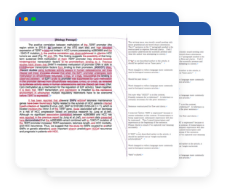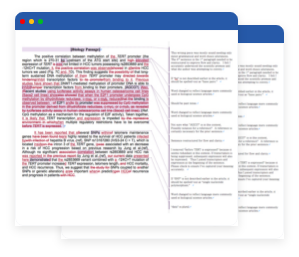代名詞の種類と例
代名詞は名詞の代わりをする単語です。代名詞は、主語、直接目的語、間接目的語、前置詞の目的語、またはスピーチの他のパートとして機能でき、人物・場所・動物・物の代わりをします。代名詞には次のようないくつかの種類があります。 人称代名詞・関係代名詞・指示代名詞・再帰代名詞・疑問代名詞・所有代名詞
代名詞の種類
| 代名詞の種類 | 役割 | 代名詞の例 |
|---|---|---|
| 人称代名詞 |
人、場所、物、アイデアを指す |
I, me, she, we, us, them, it, you, they |
| 関係代名詞 |
センテンス中の別の名詞を指し、さらなる情報を追加する |
Who, whom, whose, which, that, when, where |
| 指示代名詞 |
既出の名詞を指す |
This, that, these, those, such, none, neither |
| 不定代名詞 |
特定されない、または特別ではない名詞を指す |
Anybody, everybody, nobody, somebody, anyone, everyone, no one, someone, anything, everything, nothing, something |
| 再帰代名詞 |
主語に自己言及し、センテンスの目的語となる |
Myself, yourself, yourselves, ourselves, himself, herself, itself, themselves |
| 疑問代名詞 |
質問を投げかけ、特定の名詞について問う |
Who, what, which, whose |
| 所有代名詞 |
ある名詞を所有していることを表す |
My, our, your, his, her, its, their |
人称代名詞
人称代名詞は、ある特定の人称を指すときに使い、一人称(I)、二人称(you)、三人称(he, she, it, they)があります。性別、数、代わりとなる名詞の格によって人称名詞の形が異なります。「I」「you」「he」「she」「it」「we」「they」「me」「him」「her」「us」「them」はすべて人称名詞です。
- Example
- She is clever.
- Example
- Did you make a reservation for three?
- Example
- I hope you will invite them to the party.
先行詞
センテンス中で、名詞が明確に特定されていないときの代名詞は、誰・何を指しているのかが曖昧なため、意図する人・物とは別の人・物について指していると取られてしまうこともあります。センテンス中で代名詞を使う際、その代名詞が何を指しているのかを読み手に知らせるために先行詞を使う必要があります。先行詞はセンテンスの冒頭に出てくる名詞または名詞句のことで、それ以降は代名詞に置き換えられます。
- Example
- Sam drank most of the juice that he bought.
- Example
- The team has tried its best to achieve success.
- Example
- Many people lost their jobs because of the economic slowdown.
不明瞭・曖昧な代名詞の先行詞
- Example
- If you arrive late to the play, she won't let you in.
- Example
- Sam sent a letter to Mark addressing the problems he encountered during his first year at school.
関係代名詞
関係代名詞は、人・物についての情報を追加するために、関係詞節と独立節とをつなぐ際に使われます。関係代名詞は、修飾する名詞や代名詞の直後に位置します。「who」「whom」「whose」「which」「that」「when」「where」はすべて関係代名詞です。
- Example
- Is the man who came to look for you your father?
- Example
- She likes books that tell stories of famous people.
- Example
- That store, where we usually buy our groceries, is closed for the holidays.
「who」と「whom」:主語および目的語としての代名詞
「who」と「whom」のどちらを使うのか迷うことがあると思います。どちらも代名詞として使えますが、その使い方は異なります。「who」はセンテンスの主語を指している一方、「whom」は動詞または前置詞の目的語を指すときに使います。
- Incorrect
- Whom should be elected as the leader?
- Correct
- Who should be elected as the leader?
- Incorrect
- He is the person to who I am married.
- Correct
- He is the person to whom I am married.
- Incorrect
- You didn’t specify the officer who I should give this form to.
- Correct
- You didn’t specify the officer to whom I should give this form.
指示代名詞
指示代名詞は、センテンス内の特定の人・物を指す際に使います。このような代名詞は、時間やスペースの程度を表すために使うことができます。「this」「that」「these」「those」「such」「none」「neither」はすべて指示代名詞です。
- Example
- He is late again. That boy is really getting on my nerves.
- Example
- She loves all kinds of sports. These include badminton and soccer.
- Example
- I don't like math or science. Neither is fun.
不定代名詞
不特定または一般的な人物や物を指す際には不定代名詞を使います。「不定」冠詞と同様、このような代名詞は特定されない人物や物に言及する際に使われます。「anybody」「everybody」「nobody」「somebody」「anyone」「everyone」「no one」「someone」「anything」「everything」「nothing」「something」は不定代名詞です。
- Example
- No one likes to have to beg for something.
- Example
- Everyone is welcome to join the class.
- Example
- Anything is possible only if you keep trying.
再帰代名詞
再帰代名詞は、センテンスの主語に戻って言及するときに使います。再帰代名詞の語尾は、単数の場合には「-self」、複数の場合には「-selves」で終わります。「myself」「yourself」「yourselves」「ourselves」「himself」「herself」「itself」「themselves」は再帰代名詞です。
- Example
- I saw myself in the mirror.
- Example
- The book itself isn't difficult, but it's not fun to read.
- Example
- They recommend this movie even though they have never seen it themselves.
疑問代名詞
疑問代名詞は、質問を投げかけたり、情報をより明らかにするときに使われます。「who」「what」「which」「whose」は疑問代名詞です。
- Example
- Which essay did you like the best?
- Example
- Whose bag is this?
所有代名詞
所有代名詞は、所有または、何か・誰かが、誰か・何かと結びつきがある・密接に関連していることを表す際に使います。「my」「our」「your」「his」「her」「its」「their」は所有代名詞です。所有代名詞は、同じ単語を2度書くことを避けるために使えることから、センテンスを簡潔化できます。
- Example
-
I don't know where my sneakers went, so my sister lent me her sneakers.
I don't know where my sneakers went, so my sister lent me hers.
- Example
-
Your plan sounds just as exciting as my plan.
Your plan sounds just as exciting as mine.
代名詞の正しい使い方を理解することで、文の明確性と一貫性が向上し、読み手に正確な情報を伝えることができます。また、カンマやピリオドなどの使い方にも注意を払い、句読点チェッカーなどのツールを活用して仕上げを確認することもおすすめです。











